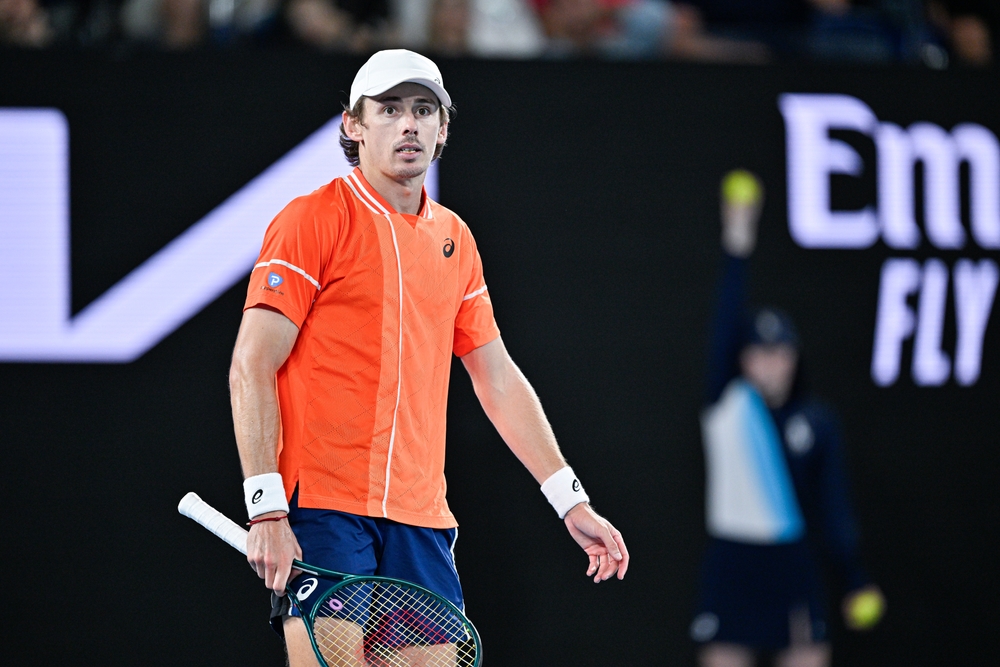You know that feeling when you’re down to your last life in a video game and somehow pull off the impossible? That’s exactly what Alex De Minaur experienced at the DC Open, except instead of extra lives, he had three match points staring him down like a final boss fight.
The 26-year-old Australian turned what looked like certain defeat into his tenth ATP title with a comeback that’ll have tennis fans rewinding highlights for years. His 5-7, 6-1, 7-6 (3) victory over Alejandro Davidovich Fokina wasn’t just a win – it was the kind of escape act that makes you question whether luck is actually a skill.
When everything goes wrong, then right
Picture this scenario: you’re down a set, your opponent is serving for the championship at 5-2 in the deciding set, and you’re basically one shot away from packing your bags. Most players would start mentally preparing their runner-up speech. De Minaur? He apparently decided this was the perfect time to channel his inner Houdini.
The seventh seed found himself in tennis purgatory – that special place where champions either emerge or crumble. Davidovich Fokina, the No. 12 seed, had served up three separate opportunities to claim his first ATP title. Three chances to end his 0-4 finals curse. Three moments where victory was literally one point away.
Instead, tennis served up its cruelest plot twist. The Spaniard, who’s now reached four finals without winning any, watched another title slip through his fingers like sand at the beach. If tennis had a support group for players who can’t close out finals, Davidovich Fokina would be the group leader.
The psychology of pressure points
What makes De Minaur’s escape even more remarkable is how he handled the moment. When you’re facing match points, your brain typically starts playing tricks on you. Suddenly, the court feels smaller, the net seems higher, and your opponent’s shots sound louder than a construction site.
But here’s where the Australian showed why he’s climbing toward the top 10. Instead of tightening up like most players would, he somehow found his best tennis when it mattered most. That’s not just talent – that’s the kind of mental fortitude that separates good players from great ones.
The tiebreak victory (7-3) capped off what can only be described as a masterclass in clutch performance. While Davidovich Fokina was probably questioning every life choice that led to this moment, De Minaur was busy proving that sometimes the best defense against pressure is simply ignoring it exists.
More than just another title
This victory represents De Minaur’s eighth hard court title and pushes him into the top 10 rankings just before the US Open. That timing isn’t just convenient – it’s perfect. Entering tennis’s biggest North American tournament with confidence from a comeback victory? That’s the kind of momentum that can carry players deep into Grand Slam tournaments.
For Davidovich Fokina, the story is more complicated. Rising to a career-high No. 19 ranking is fantastic, but he remains the highest-ranked man without a title. That’s like being the smartest person who’s never graduated – technically impressive, but also incredibly frustrating.
The 26-year-old Spaniard has now frittered away multiple match points in two tournament finals this year. At some point, you have to wonder if there’s a psychological component to these collapses. Tennis can be cruel that way – the sport rewards mental strength as much as physical ability.
Washington’s redemption story
De Minaur’s victory is especially sweet considering his history in the nation’s capital. He was the runner-up to Alexander Zverev back in 2018, so this title represents both redemption and growth. Seven years later, he’s not just participating in finals – he’s finding ways to win them when everything goes wrong.
The Australian’s sportsmanship after the match also deserves recognition. Walking over to console Davidovich Fokina shows the kind of class that makes tennis special. Winning is great, but winning with grace while acknowledging your opponent’s pain? That’s championship character.
The beauty of unpredictable tennis
Matches like this remind us why tennis remains endlessly fascinating. On paper, Davidovich Fokina should have won. He was serving for the match, had multiple opportunities to close it out, and played well enough to deserve victory. But tennis doesn’t care about what “should” happen.
De Minaur’s escape act proves that in tennis, as in life, it’s not how you start – it’s how you finish. Sometimes luck plays a role, but creating your own luck through persistence and mental toughness? That’s what champions do when their backs are against the wall.

